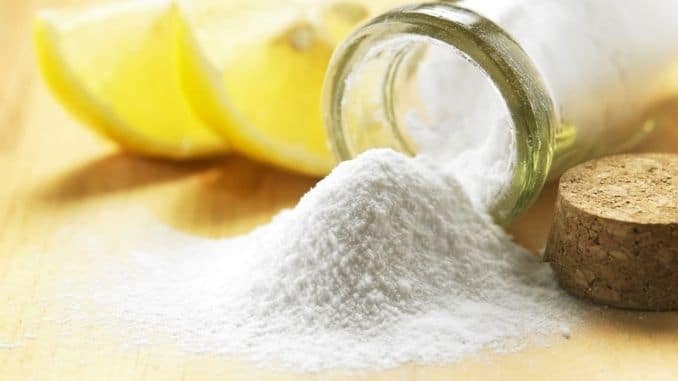Scientists have discovered a breakthrough solution that may help patients with autoimmune diseases like rheumatoid arthritis. Drinking this solution for a couple of weeks was shown to alter the immune response, reducing inflammation, swelling, and pain. This approach highlights some of the health benefits of baking soda, which has been researched for its potential to alleviate symptoms of autoimmune conditions by balancing pH levels and promoting a healthier immune function.
What was the solution? Some breakthrough pharmaceutical drug? On the contrary. It was something most people have in their kitchen cabinets right now: good old baking soda.
Indeed, it seems that baking soda has many applications when it comes to health and wellness. We’ve got the top seven for you here.
1. May Help Calm an Overactive Immune System
Autoimmune diseases like rheumatoid arthritis or lupus develop because something goes wrong with the immune system. Instead of protecting the body as it should, it attacks normal, healthy bodily tissues, resulting in inflammation. It’s that inflammation that causes pain, swelling, redness, and stiffness.
Through a series of studies, scientist found that when patients suffering from autoimmune diseases drank baking soda, the spleen, which is part of the immune system, downgraded the immune response, encouraging less inflammation.
After only two weeks on the baking soda treatment, the participants’ inflammation-causing immune cells decreased while inflammation-reducing immune cells increased.
Scientists speculated that drinking baking soda may help people with autoimmune disease by pushing the body toward an anti-inflammatory state. We need more studies before we know for sure whether this might be a good solution but, so far, the results have been promising.
2. May Help Slow the Progress of Kidney Disease
Ways Baking Soda Can Benefit Your Health: In a healthy body, the kidneys keep everything in balance, maintaining a slightly alkaline pH level of around 7.4. However, when the kidneys aren’t working as they should, the blood becomes more acidic. That, in turn, causes more kidney damage, along with muscle breakdown, insulin resistance, systemic inflammation, low blood pressure, and overall general malaise.
Baking soda seems to help by naturally buffering some of the acids in the body. This brings the overall acidity down, reducing damage and easing some of the symptoms of kidney disease.
In one study of 134 patients with advanced chronic kidney disease, those who took a small daily tablet of sodium bicarbonate (baking soda) had a rate of kidney function decline that was about two-thirds lower than patients who didn’t take the baking soda. They also experienced improvements in several areas of nutrition and were less likely to develop end-stage renal disease requiring dialysis.
Researcher Dr. Magdi Yaqoob of the Royal London Hospital in England stated in a news release that the cheap and simple strategy of using baking soda “has the potential of translating into significant economic, quality of life and clinical outcome benefits.”
Another longer, five-year study with 120 people suffering from kidney dysfunction showed similar results. Those taking the daily baking soda experienced improvements in kidney function and decreases in kidney damage.
Still, we don’t have large studies yet, particularly on older people, so it’s important to talk to your doctor before trying baking soda for kidney disease. It could cause complications, such as worsening high blood pressure, increased edema and potentially even heart problems.
In the future, however, baking soda may be prescribed as a way to delay kidney damage in those with chronic kidney disease. If you want to talk to your doctor about it, dosages used in studies ranged from 1.5 grams per day (g/day) to 5 g/day. Be sure to monitor your blood level of bicarbonate while taking baking soda to keep your pH level in a healthy range.

3. Ease Heartburn
Ways Baking Soda Can Benefit Your Health: If you eat a spicy meal or consume your dinner too quickly, you may suffer from a case of heartburn. This painful condition develops when foods stimulate the release of excess stomach acid and that acid backs up into the tube that carries food from your mouth into your stomach (esophagus).
Symptoms of heartburn typically include a burning sensation in the chest that often occurs after eating or at night, pain that gets worse when you lie down and a bitter or acidic taste in your mouth.
You can take an antacid to help ease these symptoms, but if you don’t have one around, baking soda can work just as well. It’s long been used as an inexpensive and readily available remedy for occasional heartburn and indigestion. It naturally neutralizes the excess acid in the stomach, calming things down and putting out that flaming feeling in your chest and throat.
Understand, however, that baking soda is high in sodium, and it can interfere with the absorption of some medications. It’s best used for occasional bouts of indigestion — it is not recommended as a long-term solution.
Try mixing one teaspoon of baking soda into an 8-ounce glass of warm tap water. Stir vigorously until all the baking soda dissolves, then drink quickly. You can repeat every two hours until the heartburn is gone. Sodium bicarbonate is also available in tablets and effervescent powders, which may work better for this purpose.
4. May Help Improve Some Cancer Treatments
Ways Baking Soda Can Benefit Your Health: There is some evidence that baking soda may boost some cancer therapies, helping them to work better inside the body. Just like baking soda reduces the acidity of blood in those with chronic kidney disease, it may do the same in some people undergoing treatment for cancer.
In a 2018 study, scientists acknowledged previous research that showed baking soda seemed to enhance cancer immunotherapy, but they weren’t sure why. Then, they conducted their own experiment and found that when subjects drank baking soda water, they “awakened” cells in a cancerous tumor, making them more sensitive to cancer therapies.
As a cancer tumor grows, large portions of it become deprived of oxygen, which creates more acidic conditions around the tumor. Cells that lack oxygen slow down and enter a dormant state, becoming immune to chemotherapy. However, when subjects consumed baking soda, it helped reduce the acid and reawaken these cells, making them vulnerable once again to the effects of chemo and other treatments.
Scientists are still researching the connection, but they do know that cancer therapies are less effective in acidic conditions, so it seems to make sense that baking soda could help. “The concept is so easy,” said lead researcher Chi Van Dang, scientific director of the Ludwig Institute for Cancer Research. “It’s not some $100,000 per year drug. It’s literally just baking soda.”
5. May Improve Athletic Performance
Ways Baking Soda Can Benefit Your Health: When you work out, you challenge your muscles, and they require oxygen to meet that challenge. If you’re running, biking or engaging in other types of aerobic exercise, pretty soon your muscles will need more oxygen than what you’re breathing in.
The body creates that additional oxygen through a process known as the “anaerobic pathway.” This process produces lactic acid. Too much lactic acid in the muscles makes the tissues more acidic than usual and may limit their ability to contract. That can lead to fatigue, reducing exercise performance.
You can see where we’re going here. Adding some baking soda to the mix seems like it might reduce that acid, right? Studies have suggested that it may do just that. In a 2013 study, for example, researchers found that consuming baking soda about one to two hours before exercise had a moderately positive effect on sports involving up to seven minutes of sustained strenuous exercise and could also be useful for prolonged sports involving intermittent or sustained periods of high-intensity work rates.
The researchers concluded that baking soda supplementation before high-intensity workouts helped promote better training performance.
Other studies have found similar results for those participating in sports like cycling, sprinting, swimming and team sports. Baking soda has also been found to help in interval training, preventing decreases in performance when running, cycling, rowing, swimming, weightlifting, and CrossFit.
Always check with your doctor first, but then you may try 90 milligrams (mg) to 135 mg of baking soda per pound of body weight taken 6one to three hours before exercise. Don’t take larger doses as they can be dangerous.
6. Soothe Sore Throat
Ways Baking Soda Can Benefit Your Health: Your mom may have told you to gargle with baking soda water when you were suffering from a sore throat. This traditional home remedy kills bacteria that cause inflammation and pain.
To try this remedy, mix one cup warm water with 1/4-cup baking soda and a 1/8-cup teaspoon of salt. Gargle and swish the solution around in your mouth and throat gently, then spit out. Repeat every three hours as needed.

7. Fight Nasty Athlete’s Foot
Ways Baking Soda Can Benefit Your Health: Athlete’s foot is a skin infection caused by a fungus. This fungus can be found anywhere, including in locker rooms, on nail clippers and around public places like pools and saunas. It thrives in moist, warm conditions, which is why it likes living on sweaty feet.
The infection commonly develops between the toes and can cause red, scaly, flaky and itchy skin as well as cracking, burning and sometimes oozing or crusty blisters. It can be stubborn to treat and often returns even after you think you’ve gotten rid of it.
Over-the-counter treatments can help treat the infection and soothe the symptoms, but you can also use baking soda. Its natural antimicrobial properties help kill the fungus.
Make a paste of one tablespoon of baking soda with a little lukewarm water, then rub the paste on the affected areas, particularly between the toes. You can also add some cinnamon powder to the paste as it has antifungal properties too and can leave behind a pleasant scent. Let it sit for five to 10 minutes, then rinse and dry thoroughly. Apply cornstarch before putting socks on to help keep feet dry.
You can also soak feet in a baking soda solution. Add about a half-cup of baking soda to a large bucket or basin of warm water and soak feet for 15 to 20 minutes twice a day. Don’t rinse, but pat dry.
A Word of Caution
Although baking soda can be helpful when used short term and has much potential for treating a variety of conditions, it is important not to believe everything you read on the Internet. Some sites suggest, for example, taking baking soda to cure a urinary tract infection (UTI).
The idea is that the baking soda will neutralize the acid in the urine, helping the body fight the infection, but no studies are supporting this assertion. Worse, taking baking soda incorrectly can result in complications like electrolyte imbalances and respiratory problems.
Using a home remedy on a UTI may also cause you to delay medical treatment, which can allow the infection to spread, potentially causing additional complications. Baking soda and water can help temporarily ease the burning of a UTI but always check with your doctor.
For your guide to the foods that will heal your body and help you lose weight, check out The Best Foods that Rapidly Slim & Heal in 7 Days, here!


